Luka Modrić Named in FIFA World XI for Sixth Time
February 27, 2023 - Luka Modrić has been named in the FIFA World XI, an honor he received for the 6th time in his career.
Luka Modrić has been selected as one of the best 11 players in the world this year by FIFPRO, an international association of professional football players. This is a traditional choice in which thousands of football players vote on 27 nominees - three goalkeepers and eight defenders, midfielders, and attackers.
This time there were two Croatian footballers to choose from - 21-year-old Joško Gvardiol and, of course, Luka Modrić. This is the sixth time the Croatia national team captain has been elected to the world's best 11 and the first time since 2019. Luka was named in the best 11 five times in a row from 2015 to 2019. Modrić was not at the ceremony in Paris tonight.
The FIFA World XI includes Thibaut Courtois of Real Madrid in goal, Achraf Hakimi of PSG, Virgil van Dijk of Liverpool, and Joao Cancelo of Manchester City in defense. In addition to Modrić, the midfielders include Casemiro of Manchester United and Kevin de Bruyne of Manchester City. In the attack is PSG duo Lionel Messi and Kylian Mbappe, Erling Haaland of Man City, and Modrić's teammate Karim Benzema.
For the first time since 2006, there is no Cristiano Ronaldo in this selection. The Portuguese footballer left Manchester United last year and went to Saudi Arabia. His biggest rival Lionel Messi was selected for the 16th time in a row.
Messi won the FIFA Men's Best Player award, receiving this recognition for a record seven times. Polish striker Robert Lewandowski won the award in 2020 and 2021. Messi celebrated in 2009, 2010, 2011, 2012, 2015, 2019, and 2022, while Cristiano Ronaldo has five laurels, and Brazilian Ronaldo and Zinedine Zidane three each. Luka Modrić won this award in 2018, the same year he won the Ballon d'Or.
To follow the latest sports news in Croatia, follow TCN's dedicated page.
FIFA Gives Robert Ljubičić Green Light to Play for Croatia
January 7, 2023 - FIFA has given Robert Ljubičić the green light to change his football citizenship. The 23-year-old Dinamo Zagreb midfielder can now play for the Croatia national team!
In November 2022, Robert Ljubičić decided that he wanted to represent the national team of Croatia in the future, after which the process began with FIFA to change his football citizenship from Austrian to Croatian. After months-long efforts, Ljubičić can play for Croatia!
Ljubičić started his senior career at St. Pölten, after which he played for Rapid Wein and came to Dinamo Zagreb in the summer of 2022.
"We are happy with the decision that Robert can play for the Croatia national team, and we believe that it will strengthen Zlatko Dalić's squad. I thank the management of GNK Dinamo, led by president Vlatka Peras, for supporting Robert and HNS in this process, as well as our technical director Pletikosa and the Federation's administration, who once again did a superb job in communicating with the player and with FIFA. Of course, I am most pleased that Robert and his family chose to play for Croatia, which confirms how strong the cult of our national team is and how much patriotism our people raise their children with abroad. It's up to Robert to impress the coach with his games, and I welcome him to the Croatian football family," said HNS president Marijan Kustić.
"It was not easy to make such a decision considering that I grew up in Austria, where I also developed in football, for which Austria, my coaches, and clubs have my utmost gratitude and respect. However, Croatia is in my blood, it is my family, and I felt a strong desire to represent Croatia as my homeland. I thank HNS and Dinamo for supporting my family and me during this process, and I will continue to work hard to earn a call-up to one of the best national teams in the world, which would fulfill my football dream," said Robert Ljubičić.
"First of all, thank you to Robert and his family for the pleasant communication. Robert proved to be a very serious and intelligent young man who made a decision that made us happy - that he wanted to play for Croatia. I'm glad we formally made it possible and thus got a quality candidate for the national team. Now it is up to Robert to earn coach Dalić's trust with his games. Of course, we in the Federation believe that he can contribute to the national team with his football skills," said the technical director of the Croatia A and U-21 national teams, Stipe Pletikosa.
Source: HNS
To follow the latest sports news in Croatia, follow TCN's dedicated page.
How Much Cash Will HNS Get from FIFA? How Much Will Players Earn?
December the 19th, 2022 - Following an absolutely incredible performance at 2022's World Cup over in Qatar, the Croatian national team arrived home this evening to a packed Ban Jelacic Square and a welcome home celebration reminiscent of scenes from 2018 - which they thoroughly deserved. With football fever now over for another four years, just how much will HNS get from FIFA, and how much will Croatia's players earn from the government?
As Poslovni Dnevnik writes, the Croatian national team (or the Vatreni, if you prefer) played an absolutely fantastic game of which we can all be very proud, they defeated Morocco 2:1 and pocketed the bronze medal. Thanks to them having showcased Croatia's enormous sporting spirit, they will all also receive handsome amounts of money, but how much does it all amount to, precisely?
HNS will receive a cheque for 30 million dollars (Morocco will receive one worth 25 million dollars) from FIFA for coming third place, and this sum will later be divided between the federation itself and the Croatian national team in a ratio of 60-40 or 55-45 percent. It will be carried out in whichever manner the two parties agree.
Of the amount that will go to those who deserved it the most, 80 percent will be paid directly into the Croatian national team players' personal bank accounts, and 20 percent to the members of the team's dedicated coaching staff.
That's not all, because all members of the Croatian national team will all also receive 120,000 kuna each from the government, as this is according to the regulation for awards to athletes in Olympic sports for medals won at world championships held every four years, i.e the World Cup, as published by tportal.
For more, make sure to check out our dedicated news section.
FIFA Disciplinary Committee Confirms Croatia's Fine for Fan Taunts at Milan Borjan
December 7, 2022 - The FIFA Disciplinary Committee has confirmed Croatia's fine for fan taunts at Canada goalkeeper Milan Borjan in their second-round Group F match at the World Cup on November 27, 2022.
The disciplinary committee of the International Football Federation (FIFA) fined the Croatian Football Federation (HNS) 50,000 Swiss francs for the behavior of some fans at the 2022 World Cup match against Canada in Qatar.
During the match, some Croatia fans insulted the Canada goalkeeper Milan Borjan, who has Serbian roots and had previously made inappropriate statements about the Homeland War and being born in Krajina, not Croatia, back in 1987. A poster with offensive content referencing his leaving Croatia also appeared in the stands.
"The Croatian Football Federation was fined 50,000 Swiss francs for violating Article 16 of the FIFA Disciplinary Code (use of words and objects to convey a message that is not appropriate for a sporting event) in connection with the behavior of Croatia fans during the match against Canada," FIFA announced.
The Football Federations of Serbia and Saudi Arabia were also fined.
Serbia was fined 20,000 Swiss francs for "violations of Article 11 of the FIFA Disciplinary Code and Article 4 of the 2022 FIFA World Cup Regulations about the flag displayed in the dressing room after the match against Brazil," they said.
Namely, after the match against Brazil, a flag was hung in Serbia's dressing room with a map of Kosovo painted in the colors of the Serbian flag, with the slogan: "No surrender."
The Saudi Arabian Football Federation has been fined 15,000 Swiss francs twice for misconduct by players who earned six yellow cards during matches against Argentina and Mexico.
Source: HRT
To follow the latest sports news in Croatia, follow TCN’s dedicated page.
FIFA Disciplinary Case Opened against Croatia for Fan Taunts at Canada Goalkeeper
November 29, 2022 - The FIFA Disciplinary Commission opened a case against the Croatian Football Federation (HNS) due to the fan behavior at the 2022 World Cup match between Croatia and Canada on Sunday, November 27.
"HNS was reported due to the discriminatory and xenophobic behavior of some Croatia fans at the match against Canada, as well as for the banners with the same content," released HNS on Tuesday.
A group of Croatia fans insulted Canada goalkeeper Milan Borjan, who has Serbian roots and who previously made statements about the Homeland War.
When Croatia won 4-1, an offensive poster appeared in the stands, accompanied by offensive shouts.
"Borjan, Ustašo" was among the chants, though special attention was drawn to a John Deere banner. In addition to "Knin 95" written on it, the company's slogan was changed from "Nothing runs like Deere" to "Nothing runs like Borjan". John Deere is the most famous brand of tractors in the world. This means of transport is a symbol of the mass flight of Serbs during Operation Storm, which liberated Croatia from the occupied territories in 1995. Around 200,000 Serbs left the so-called "Republic of Serbian Krajina" in August of that year, including the then 7-year-old Borjan, reports Index.hr.
Borjan reacted by showing the fans a three-finger sign or Serbian national salute. After the game, Borjan said he received several messages from 'primitive' Croatia fans after his phone number was leaked before the game.
"Disciplinary proceedings have been initiated due to the behavior of some of our fans. I cannot comment on individual proceedings, but HNS always condemns discrimination and racism. We have six days to respond, and the Federation will most likely make a statement, and then we will see what happens next," said HNS spokesman Tomislav Pacak.
To follow the latest sports news in Croatia, follow TCN’s dedicated page.
2022 World Cup Impressions from a Croatian Female Football Journalist in Qatar
November 24, 2022 - The media has had a lot to say heading into the controversial 2022 World Cup in Qatar, but what’s it really like on the ground? TCN Sports Editor Daniela Rogulj shares her impressions as a Croatian female football journalist in Qatar.
There has been a lot said going into this World Cup, and I won’t bore anyone by repeating it. Having read many articles before I departed for Doha on November 21, I, too, was a bit nervous. From the rules in Qatar to the FIFA organization, how would the world's biggest football tournament play out?
I will begin by saying this - Qatar has exceeded my expectations.
I arrived at 4 am on November 22, unsure how I would begin the journey to my accommodation in The Pearl district of Doha, located north of Hamad Airport. The metro didn’t start running until 6 am, meaning two hours to kill at the airport were inevitable. After disembarking the plane, there was undoubtedly some anxiety surrounding customs and having the correct documentation (which I checked 100 times). But the journey from the plane, through passport control and customs, was a breeze. I was off the plane and through customs in 15 minutes, along with several other Croatia fans.
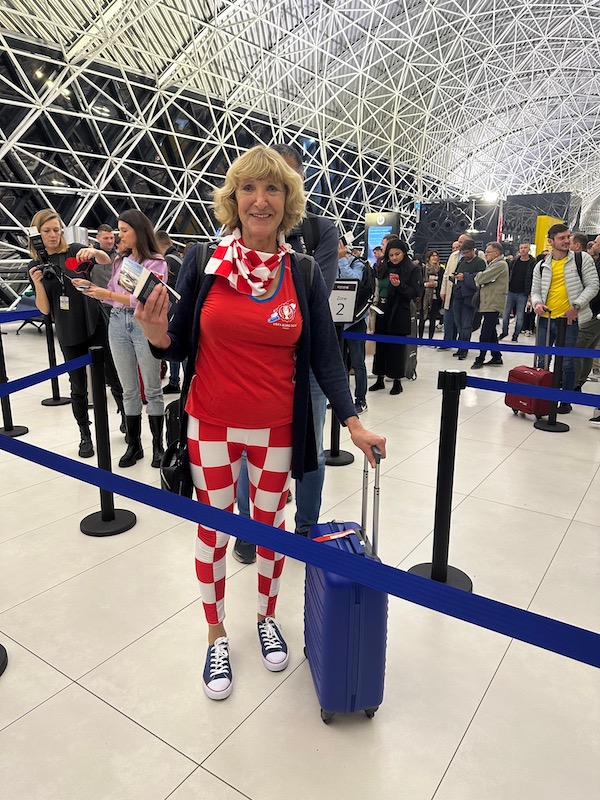
Once I made it into baggage claim, hundreds of football fans from all over the world arrived too, at 4 am, enthusiastically wearing the jerseys of their national teams. I don’t think I’ve ever seen an airport so full of life at 4 am, with so many people on the ground, ready to help anyone who needed assistance find the right transportation to their accommodation. Free SIM cards were also handed out at the airport to all fans, valid for three days. A wonderful gesture that everyone appreciated.
And another wonderful gesture? All public transport is free during the World Cup, making it easy for fans to get around by simply showing their Hayya Card.
The 6 am metro to Legtaifiya Station, where I needed to connect to get the bus to The Pearl, was perhaps the cleanest metro I’ve seen. And it was packed with football fans and Qatari locals heading to work. A wonderful mix of fan atmosphere and everyday local life during the world's biggest tournament.
Arriving in The Pearl without WiFi and relying on a GPS location sent by FIFA for my apartment building was... not the easiest time. It was 7 am, getting warm, and I was being spun into circles trying to find the building. Fortunately, I was able to catch a few locals walking their dogs at 7 am, who happily helped and directed me as best they could. I ended up in the wrong building anyway. The wonderful receptionist at the building spent 45 minutes with me to find the right building, as did lovely security guards along the way. This was by far the most stressful part of my time here, and it has been smooth sailing ever since.
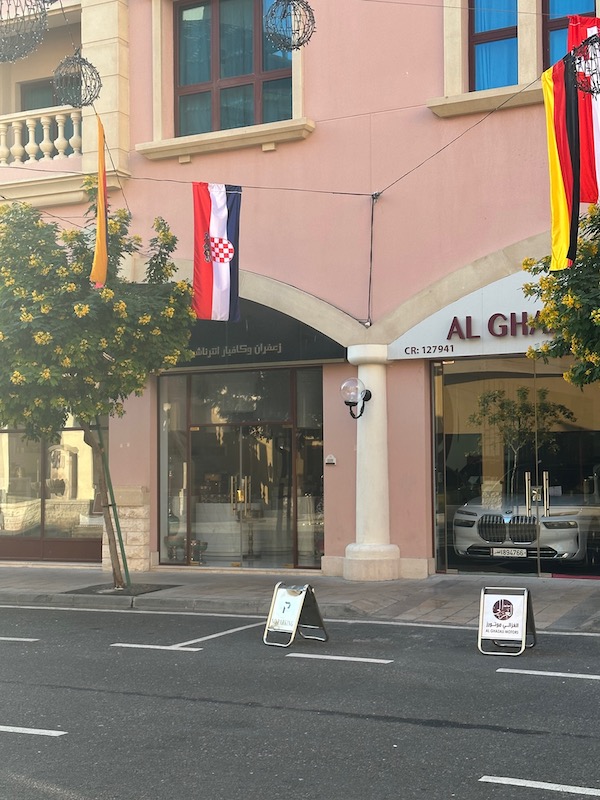
My Accommodation
Is a dream. I booked through the official FIFA media accommodation. While not cheap ($265/night), I have an enormous one-bedroom, 1.5-bath apartment with a full kitchen, TV, and balcony hovering over the heart of The Pearl. The Pearl area is a luxurious artificial island on the coast, built on one of Qatar’s previous major pearl diving sites, as Qatar was once a major pearl trader. The Pearl resembles a string of pearls, and it’s an absolute gem sprinkled with high-rise apartment buildings, luxury brands, and bustling shops and restaurants. Not to mention that everything stays open until at least 2 am, including restaurants and markets. No matter the hour, everyone is out having a good time.
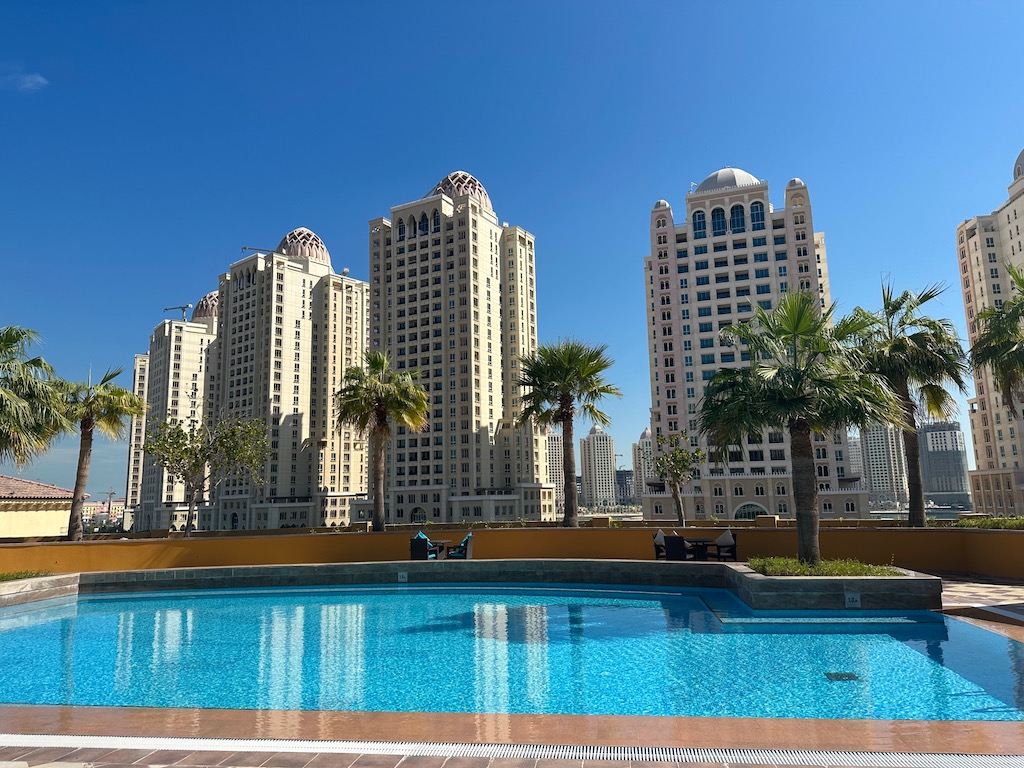
The Locals
I've encountered the loveliest locals, and I can't say enough about how incredible they have been. Everyone has been beyond eager to help, with a smile. No matter where I’ve gone, from public transport to coffee shops or supermarkets, I have felt welcomed. They have given up their seats for me on the metro, escorted me to my final destination, and shared their mobile phone hotspots when I didn’t have service. Overall, the locals are proud to show their country to the world, and their genuine hospitality so far has been second-to-none. I've made an effort to speak to as many as I can.
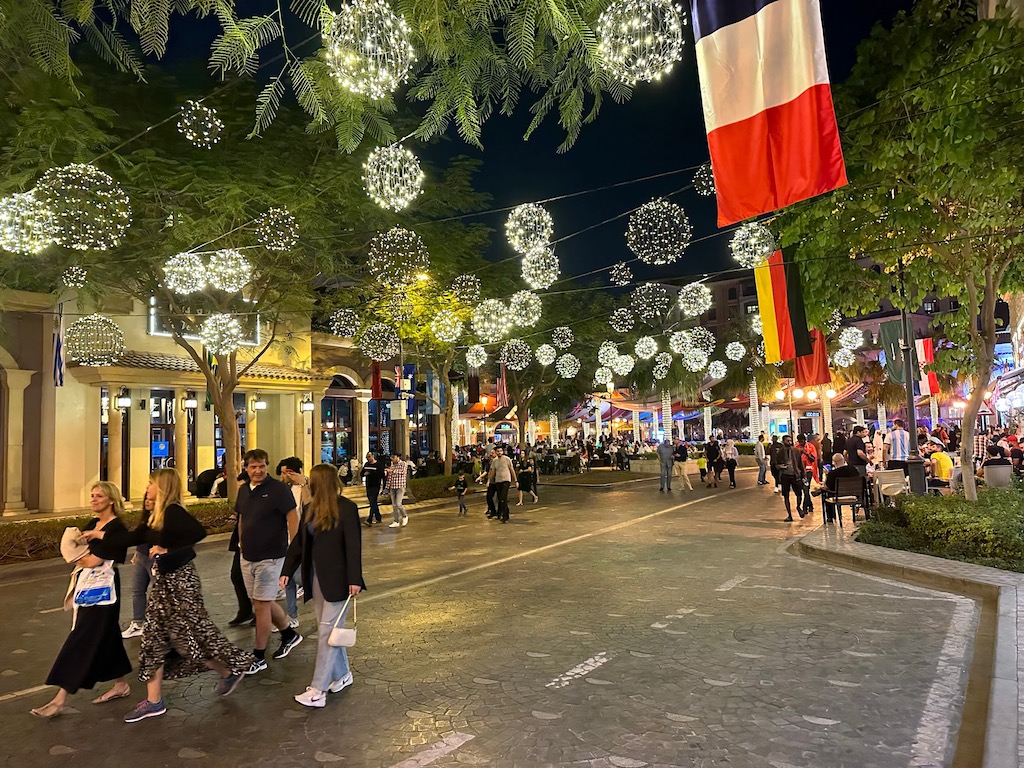
The Prices
Well, The Pearl isn’t exactly cheap, but it’s also about knowing where to go, which took a few days. For example, a large iced coffee in a tourist area can cost you 6 EUR, while around the corner, you can find it for half the price. The Monoprix supermarket near my accommodation can be compared to Whole Foods, though you can go to the Spar market just a few minutes further instead. A 1.5-liter bottle of water is just over 1 EUR. Meals average around 40-60 QAR, or 10 to 15 EUR, depending on where you decide to eat. You also have a world of choices depending on your budget, from Nando’s to Burger King and Fatburger or much nicer international restaurants. The food options are endless.
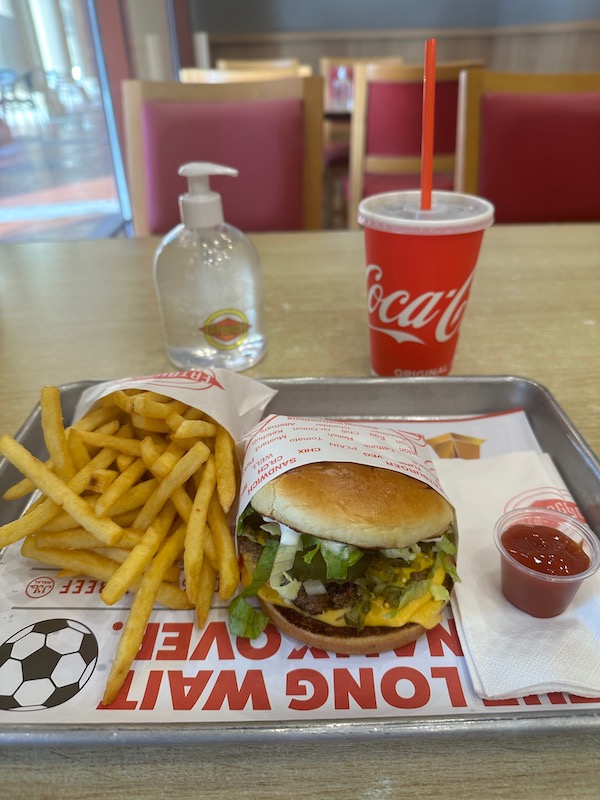
Media Perks
Indeed my experience as media is different from a fan, and there are definitely perks. Like media transport from my accommodation to the main media center. From there, I pick up a media shuttle to the stadium. The buses run frequently, and you can catch one every 15 minutes ahead of games. After the match, you hop back onto the media transport to the main media center. The only downside? Some stadiums take over an hour to get to. Buses back to the accommodations run every 30 minutes after the match. My bus journey is a bit longer compared to others staying in more central Doha areas, but all buses have WiFi and are beyond comfortable. If I catch a match at 10 pm, I return to my accommodation around 2 am.
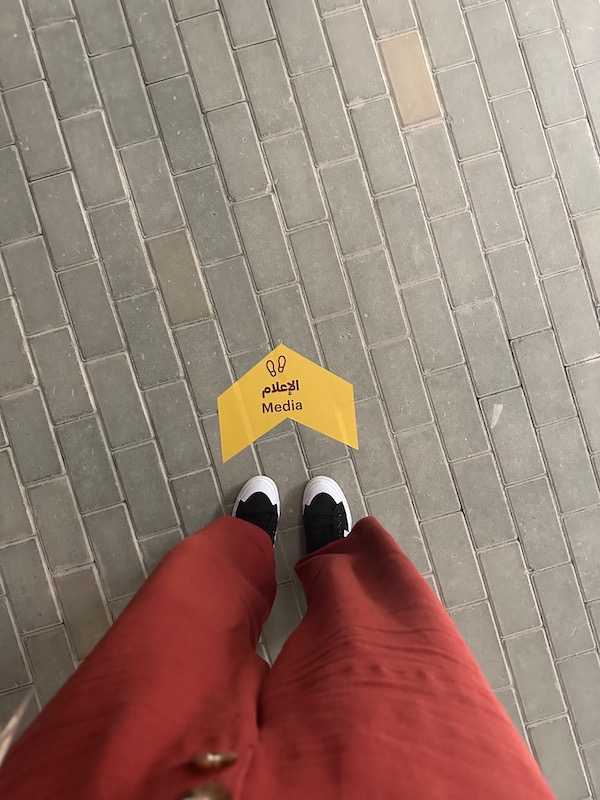
Media also has more affordable prices at the main media center. For example, a water bottle and Americano iced coffee cost me just over 2 EUR the other day, while there is also an affordable fresh buffet and grab-n-go sandwich options.
Pro tip: Uber is also ridiculously cheap in Qatar, and many journalists have also been using the app to get around if they don't want to rely on media transport.
The Matches
A big bonus to having the World Cup in a small country like Qatar is its accessibility, allowing fans and media to see as many games as they can - or two a day! I've applied for 11 games while I am here or one a day, mainly to ensure I have time on the laptop to deal with other commitments. TCN photojournalist Slobodan Kadić is hopping around to two a day, getting the most out of this World Cup experience.
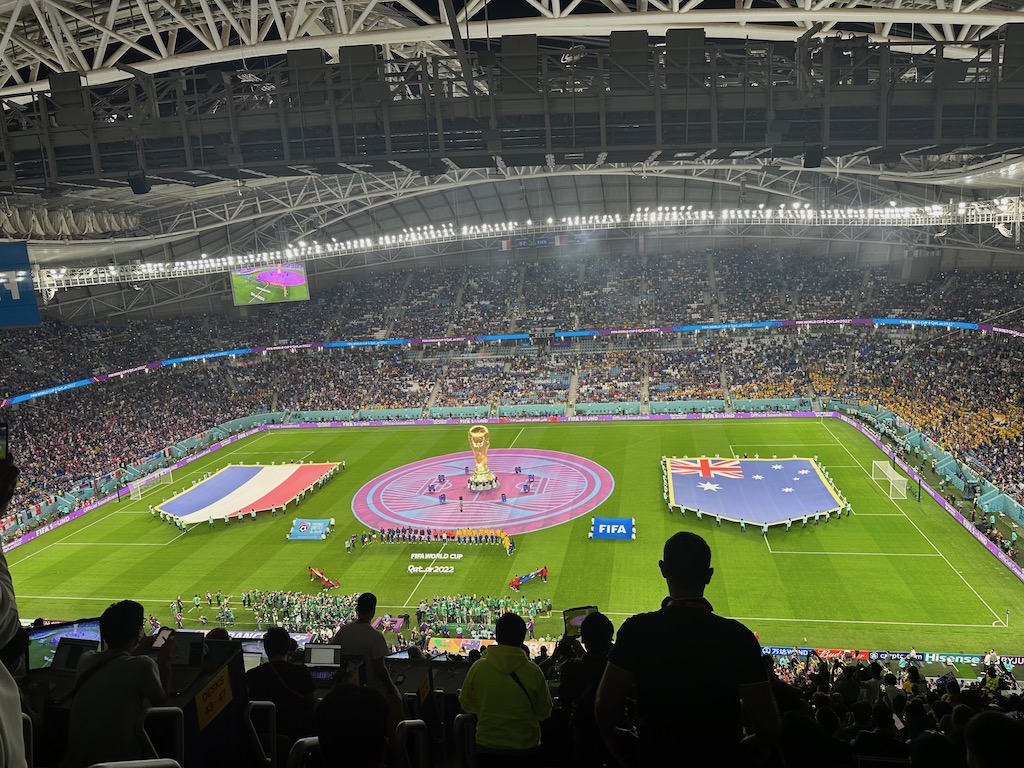
The stadiums are also as high-tech as you've seen on TV. I have been to two stadiums so far - Al Janoub for France v. Australia and Al Bayt for Morocco v. Croatia.
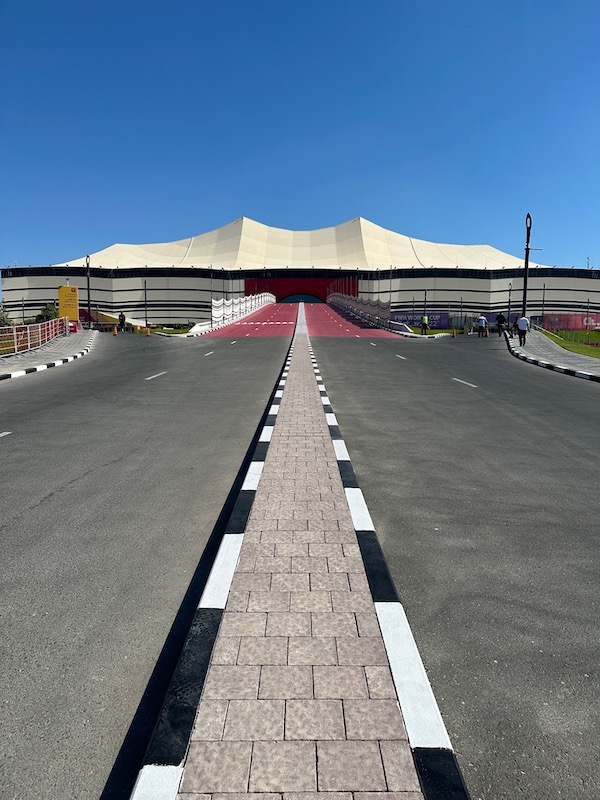
The Heat
Perhaps the only downside thus far, and not because it’s brutally hot. It’s been a comfortable 28-29 degrees Celsius since I arrived, but that doesn’t stop everyone from blasting the air con as if we were in 40+ temperatures. This has been especially tough for European journalists (and apparently teams) who aren’t used to air conditioning. I’ve noticed many blowing their noses while asking bus drivers to switch off the air completely. I almost feel as if I’m back in the United States.
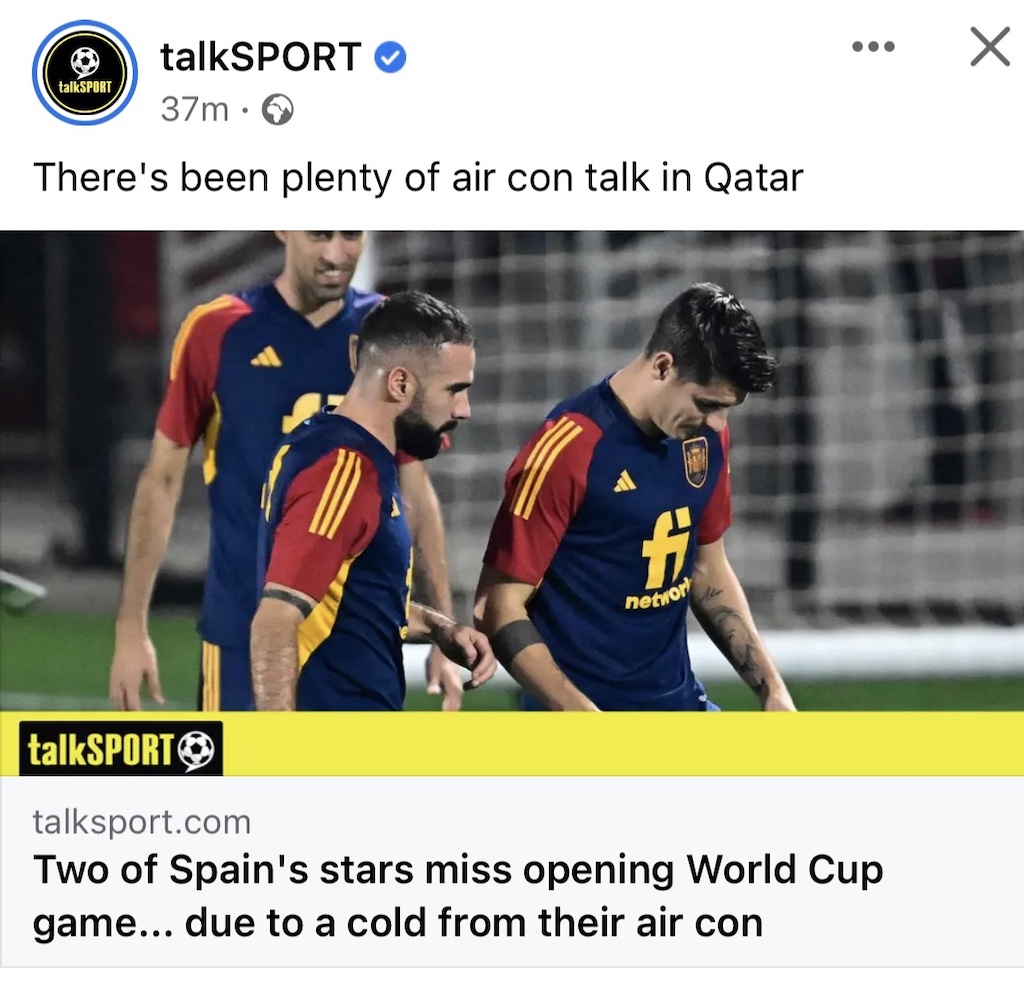
The Clothing
I was initially quite nervous about this aspect after reading countless blogs about the appropriate attire in Qatar, especially considering the high temperatures. So I packed accordingly, with long trousers, light denim jeans, and linens as often as possible. All t-shirts also cover my shoulders to respect the rules in place. However, it's not as strict as it was made out to be. May fans and ex-pats have walked around in tank tops and shirts, mixing with locals dressed far more conservatively. I haven’t seen anyone asked to cover up yet, though I know stricter rules apply in different areas.
The Booze & Nightlife
While I have yet to experience it, I have spoken to many others here for the tournament or who have been here setting up for the last month. There are several places to find international beverages, from hotels to some pubs, as well as music festivals and DJ events running until the early morning hours. It seems to be a lot easier than many thought. The official FIFA fan zones also sell beer. I will make it there eventually.
And have I been treated any differently as a female journalist here?
Absolutely not, even though our male counterparts hugely outnumber us.
Overall, my time in Qatar has been better than I imagined. Here’s to another exciting eight days and much more to come.
To follow the latest sports news in Croatia, follow TCN’s dedicated page.
Croatia and Morocco Ends Without Goals in 2022 World Cup Opener at Al Bayt Stadium
November 23, 2022 - Croatia opened their 2022 World Cup campaign at Al Bayt Stadium against Morocco on Wednesday.
After an incredible run in 2018, where they finished as World Cup finalists, Croatia opened their 2022 World Cup campaign four years later. Croatia and Morocco met on Wednesday at Al Bayt Stadium in Qatar to kick things off. Croatia is in Group F, with Canada and Belgium up next in their group.
Dalić and Modrić spoke to the media on Tuesday before the match. Dalić revealed he is satisfied with preparations, although lasting only a week as players gathered in the middle of the club season. Even with the short time together, Dalić said that Croatia is ready for the 2022 World Cup.
TCN is on the ground in Qatar following Croatia in the group stage of the tournament. It was a balmy 27 degrees Celsius at Al Bayt Stadium, located north of Doha in Al Khor, Qatar.
The starting lineups for today’s match are as follows:
Morocco: Bono - Hakimi, Aguer, Saiss, Mazraoui - Amrabat, Amallah, Ounahi - Boufal, Ziyech, El-Nesyri
Croatia: Livaković - Juranović, Lovren, Gvardiol, Sosa - Modrić, Brozović, Kovačić - Vlašić, Kramarić, Perišić
Match report
Croatia possessed well in the first minute of the match and played out for a Morocco goal kick. There were howls from the Morocco fans in the stands every time Croatia touched the ball.
Croatia's first corner came in the 5th minute of the match. Modric and Kovacic played it short, with Luka sending the ball into the box. Morocco ultimately cleared the ball, but it went back into Croatia's possession.
Morocco had their first dangerous attack in the 7th minute. Croatia's defense cleared it and took back the ball.
Another slight scare for Croatia happened in the 10th minute when Kovacic lost the ball in Croatia's half. Gvardiol was there to clear it out for a Morocco throw-in.
Hakimi shot in the 13th minute, but it deflected off Croatia's defense and into Livakovic's hands.
Modric crossed the ball into the penalty area a minute later, with no one in front of the goal to receive it.
Perisic capitalized on a nearly fatal Morocco mistake, shooting from about 30 meters out with the ball gliding just over the crossbar.
Ziyech nailed a dangerous ball into the penalty area in the next Morocco attack, but it went out for a goal kick.
Luka fouled Hakimi right outside the box in the 19th minute. The ref called for a Morocco free kick, which was, fortunately, drilled into Croatia's wall.
Kramaric had a brilliant attack in the next play and sent the ball back into the center, which went out for Croatia's second corner.
Morocco had another dangerous play in the 25th minute when En-Nesyri was found in the penalty area. Croatia was holding more possession of the ball, but Morocco was getting more chances at goal.
The stadium exploded into Morocco fan chats often, making this feel like a true home atmosphere for them.
Brozovic had an impressive attack from the midfield and played Vlasic on the right wing, who had his back turned to the play.
Another dangerous free kick for Morocco came in the 40th minute, outside the box on the right. Brozovic chested the ball to Modric, and it was ultimately cleared out for a throw-in.
The match halted in the 42nd minute when Vlasic dropped onto the pitch, complaining of calf pain. After the medics came to assist him, Vlasic decided he could go on.
Croatia's best chance came when a Perisic and Sosa combo found Vlasic at the top of the box in the first minute of stoppage time, resulting in a brilliant save by the Morocco keeper. Vlasic and Modric both had chances to end the first half.
The match ended 0:0 at halftime.
The second half started with one sub for Croatia - Pasalic replaced Vlasic. There were no subs for the Morocco team.
There were no real dangerous attacks in the first five minutes of the second half, and then things started getting interesting.
Noussair Mazraoui headed the ball into Livakovic's hand. In the next attack, Modric played Juranovic, who crossed into the box. The ball went out for a Croatia corner. Morocco's keeper Bono brilliantly stopped Croatia from scoring, and the match stopped before Morocco could capitalize on a counter-attack as Bono and Mazraoui both called for medical assistance. Both players continued.
Modric tried playing a long ball into the box in the 58th minute, but no teammates were to be found. Mazraoui was finally subbed off for Atiat-Allah.
Morocco was awarded a free kick outside the box in the 63rd minute. Hakimi stepped up to take this one which was nailed at Livaovic's goal. Livi punched the shot out for a Morocco throw in.
Morocco subbed off Boufal for Ezzazouli in the 65th minute.
Luka intercepted the ball from the Morocco defense in the 66th minute. He and Kramaric tried moving into the box but were denied by the Morocco defense.
Croatia held possession for the next few minutes, calmly passing around in an effort to tire out the Morocco side.
Kramaric was subbed off for Livaja in the 71st minute.
Juranovic was fouled on the right wing for a free kick, Luak sent it in, and the ball was played out for a Croatia corner. The cross found Livaja, who chipped back into the box for another Croatia corner. The play ended in the hands of Bono.
The commentator announced 59,407 fans in the stands for the game.
Amrabat clipped Modric's back heel for a yellow card.
Kovacic was subbed off for Majer in the 79th minute. A Morocco handball in Croatia's favor was called for a free kick near the right sideline moments later. Luka sent the ball into the box, which found Gvardiol's head, and went out for a goal kick.
Morocco's coach entered fresh legs in the 81st minute in hopes of getting a goal. The Morocco fans grew even louder.
Juranovic was founded when running up the line for a Croatia free kick in the 87th minute.
Perisic was subbed off for Orsic in the 90th minute. Six minutes of stoppage time were added to the end of the match.
The match ended without goals (0-0).
Croatia plays Canada next on Sunday, November 27.
To follow the latest sports news in Croatia, follow TCN's dedicated page.
New FIFA Rule Allows 26 Croatia Players at 2022 World Cup
June 24, 2022 - A new FIFA rule allows each national team to bring 26 players to the 2022 World Cup in Qatar. But which 26 Croatia players will coach Dalić choose?
FIFA has officially announced that coaches will be able to register 26 players for the 2022 World Cup in Qatar. This is a rule for the first time in the World Cup's history.
The national team coaches were divided. Some advocated a larger number of footballers; others opposed it because they hold that leading a group of 26 players makes it difficult to maintain a competitive stimulus and atmosphere for everyone. However, most of them are satisfied with the rule, especially those who, like Zlatko Dalić, may have doubts and face difficult decisions about who to write off.
Thus, the Croatia coach will have a surplus of candidates. FIFA will allow anyone who wants to have 23 players as the minimum number allowed. Although Dalić has yet to make an official statement, he will likely lead with 26 players, as he did for Euro 2020.
“Given the need to retain additional flexibility due to the unique timing of the 2022 FIFA World Cup in the global calendar, as well as the wider context of the devastating effects caused by the Covid-19 pandemic on the team, it was decided:
- the maximum number of players on the preliminary list has been increased from 35 to 55,
- the number of players to be included in the final list has been increased to a minimum of 23 and a maximum of 26,
- the last day of matches at the club level will be the deadline for registration of 23 to 26 players who will make the final list, which is November 13, 2022,
- there will be 26 on the bench, of which 15 reserve players and 11 officials, one of whom must be a doctor."
The last provision is important because 23 players were allowed minutes at the Euros, meaning the coach had to send three players to the stands before each match. Now, all 26 will be on the record, so as many as 15 on the bench.
Zlatko Dalić has two Nations League games until the final selection. Logically, he will bring three goalkeepers - Livaković, Ivušić, and another, and 23 players - eight in defense, six each from the midfield and attacking line, and three as a bonus where he needs it.
In the defense, it is clear that Juranović, Gvardiol, Erlić, J. Šutalo, Sosa, and likely Barišić are safe; in the midfield, Modrić, Kovačić, Brozović, Majer, Pašalić, although he is a candidate for attack and very likely Jakić, and in the attack Perišić, Kramarić, Livaja and very likely Budimir and Brekalo. That is already 20 names to which the third goalkeeper should be added (L. Kalinić, Grbić, Labrović?). For the other five positions, strong candidates are Stanišić, Vrsaljko, Lovren, Ćaleta-Car, Vida, though not all of them from the defense will be able to come, and Vlašić and Oršić. Sučić, Petković, Pongračić, Ivanušec, Musa, and Krovinović are also candidates.
Source: Sportske Novosti
For more, make sure to check out our dedicated sports section.
FIFA Approves: Igor Matanović Will Play for Croatia!
May 25, 2022 - 19-year-old German-born Igor Matanović will play for the Croatia national team!
Igor Matanović, the Eintracht Frankfurt striker currently on loan to St. Pauli, born on March 31, 2003, in Hamburg, played in the younger ranks of the German national team. However, his Croatian roots pulled him toward the homeland and representing Croatia. Therefore, the Croatian Football Federation initiated proceedings with FIFA to change his football citizenship and acquire the right to play for Croatia, reports HNS.
FIFA approved the change on Tuesday and confirmed that Matanović could immediately defend the colors of Croatia. Furthermore, Croatia U-21 coach Igor Bišćan invited him to the national team for the upcoming qualifying matches in Norway and Estonia at the end of the fight for a spot at the European Championships.
"I am thrilled that the procedure with FIFA has been completed and that Croatia will be stronger in the future thanks to another talented player who looks forward to wearing the Croatia jersey. I want to thank all the Croatian Football Federation services for excellent work - Pletikosa and U-21 coach Igor Bišćan. With the secretary of the younger teams, Josip Tomašek, they actively participated in this process from the very beginning. It is also worth mentioning Ivica Olić, who made quality contact with Igor and his family, and I am sure that the inclusion of coach Zlatko Dalić also played a significant role. We showed great unity, everyone got involved, and obviously, Igor and his family recognized that," said the president of the Croatian Football Federation, Marijan Kustić.
"Of course, we are extremely pleased that FIFA made this decision in Matanović's case. I am sure that with his football knowledge and skills, he can immediately make a great contribution to the further success of the Croatia national teams, and his right to play for Croatia is a successful continuation of the Croatian Football Federation's efforts to put many quality players from the diaspora in our jersey. Stanišić, Sučić, Vidović, and Pašalić have already made great gains, and we will continue to work in that direction. With all deserving individuals in the Federation, from the coaches Dalić and Bišćan through Ivica Olić to President Kustić, who gave us great support in these activities, it is also worth thanking the lawyers who prepared the extensive documentation very well and presented the whole case to Fifa's body and enabled this decision to be made," said Technical Director Stipe Pletikosa.
You can read more about Igor here.
For more, make sure to check out our dedicated travel section.
Captains: Luka Modrić to Feature in New FIFA+ TV Series, Netflix Also Interested
April 16, 2022 - Croatia national team captain will feature in a new FIFA+ series called Captains, which has also caught the attention of Netflix.
Fifa has launched the FIFA + digital platform, which allows free viewing of rich content to football fans around the world, reports 24 Sata.
The series "Captains" will soon be available on the platform, which follows six captains behind the scenes as they lead their countries through the qualifications for the World Cup in Qatar, including Croatia's fierce leader Luka Modrić.
The series explores the leadership qualities of each individual but also the different roles of captains, including Pierre-Emerick Aubameyang (Gabon), Brian Kaltak (Vanuatu), Andre Blake (Jamaica), Hassan Maatouk (Lebanon), and Thiago Silva (Brazil) in addition to Modrić.
At the age of 36, Modrić remains the engine of Real Madrid and the Croatia national team, and one of the main reasons why Netflix, one of the world's largest streaming services, showed interest in the FIFA documentary. As 24 Sata has learned, they are in advanced negotiations with FIFA, and the mentioned series will probably be found on that popular streaming platform as well.
The Netflix streaming service has already released super-successful documentaries about Michael Jordan, Michael Schumacher, and Formula 1, to name a few.
The series will, among other things, feature never-before-released footage from Luka's childhood, details from his private life, and viewers will be able to see first-hand the atmosphere within the national team during their hunt for the World Cup in Qatar.
According to 24 Sata, Luka expressed regret that the cameras did not film Croatia's path to the silver medal at the World Cup in Russia. Still, this series should also arouse great interest among viewers.
Equally, FIFA+ will soon release a feature-length documentary, "Croatia: Defining the Nation," by acclaimed director Louis Myles, which talks about how football unites and connects the Croatian people and a group of friends who have gained global recognition in the face of extreme hardships. Each of them became a legend and painted their country around the world.
The film tells many stories of Croatia's bronze national team in 1998, such as Davor Šuker's Golden Boot at the 1998 World Cup, and the captain of the national team at that time, Zvonimir Boban.
To follow the latest sports news in Croatia, follow TCN's dedicated page.


